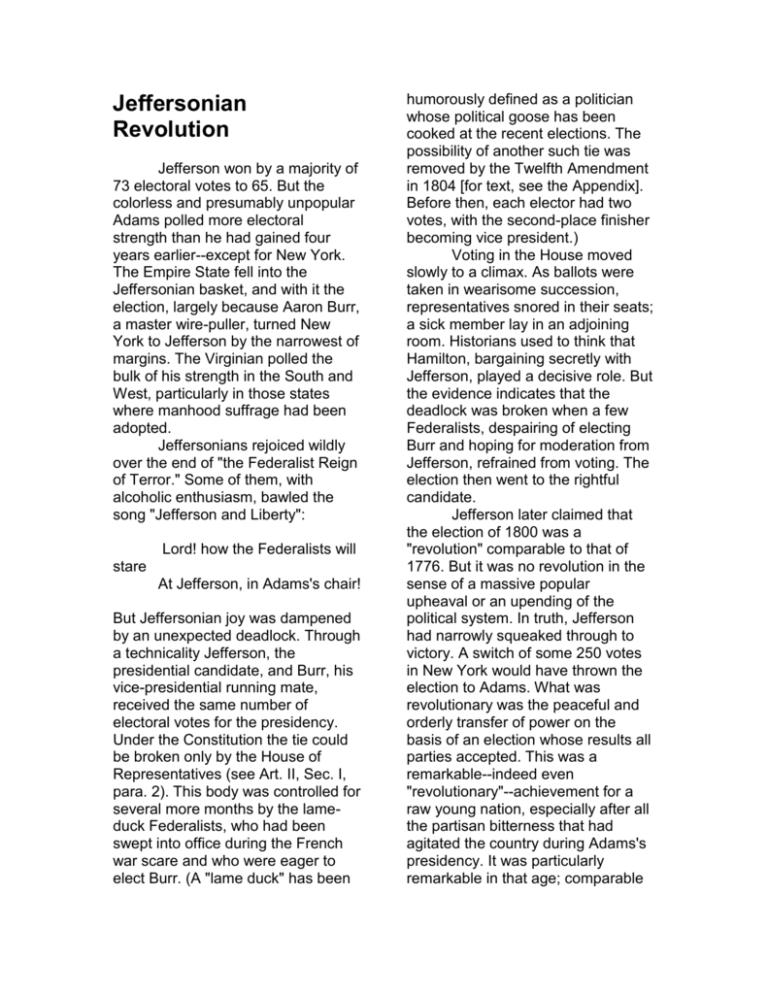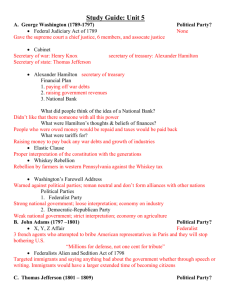Jeffersonian Revolution
advertisement

Jeffersonian Revolution Jefferson won by a majority of 73 electoral votes to 65. But the colorless and presumably unpopular Adams polled more electoral strength than he had gained four years earlier--except for New York. The Empire State fell into the Jeffersonian basket, and with it the election, largely because Aaron Burr, a master wire-puller, turned New York to Jefferson by the narrowest of margins. The Virginian polled the bulk of his strength in the South and West, particularly in those states where manhood suffrage had been adopted. Jeffersonians rejoiced wildly over the end of "the Federalist Reign of Terror." Some of them, with alcoholic enthusiasm, bawled the song "Jefferson and Liberty": Lord! how the Federalists will stare At Jefferson, in Adams's chair! But Jeffersonian joy was dampened by an unexpected deadlock. Through a technicality Jefferson, the presidential candidate, and Burr, his vice-presidential running mate, received the same number of electoral votes for the presidency. Under the Constitution the tie could be broken only by the House of Representatives (see Art. II, Sec. I, para. 2). This body was controlled for several more months by the lameduck Federalists, who had been swept into office during the French war scare and who were eager to elect Burr. (A "lame duck" has been humorously defined as a politician whose political goose has been cooked at the recent elections. The possibility of another such tie was removed by the Twelfth Amendment in 1804 [for text, see the Appendix]. Before then, each elector had two votes, with the second-place finisher becoming vice president.) Voting in the House moved slowly to a climax. As ballots were taken in wearisome succession, representatives snored in their seats; a sick member lay in an adjoining room. Historians used to think that Hamilton, bargaining secretly with Jefferson, played a decisive role. But the evidence indicates that the deadlock was broken when a few Federalists, despairing of electing Burr and hoping for moderation from Jefferson, refrained from voting. The election then went to the rightful candidate. Jefferson later claimed that the election of 1800 was a "revolution" comparable to that of 1776. But it was no revolution in the sense of a massive popular upheaval or an upending of the political system. In truth, Jefferson had narrowly squeaked through to victory. A switch of some 250 votes in New York would have thrown the election to Adams. What was revolutionary was the peaceful and orderly transfer of power on the basis of an election whose results all parties accepted. This was a remarkable--indeed even "revolutionary"--achievement for a raw young nation, especially after all the partisan bitterness that had agitated the country during Adams's presidency. It was particularly remarkable in that age; comparable developments would not take place in Britain for another generation. After a decade of division and doubt, Americans could take justifiable pride in the vigor of their experiment in democracy. But by 1800 the Federalists, blessed with more talent than wisdom, were out of place. The bustling new Republic knew instinctively where it was going. It was eager to take the high road over the mountains that would one day lead to the fulfillment of America's democratic experiment. The Federalists lost out because they were content to mark time and failed to get in step with the westward march of progress. They were unable or unwilling to unbend and appeal to the common people. They could not adapt--so they died, like the dinosaur. Distinguished though their past service had been, it was no substitute for a capacity to grapple democratically with future problems. The victorious Jeffersonians were prepared to keep the Federalist edifice while ousting the Federalist architects. As if plagued by an evil spirit, Jefferson was forced to reverse many of the political principles he had so vigorously championed. There were in fact two Thomas Jeffersons. One was the private citizen, who had philosophized in his study. The other was the public official, who made the disturbing discovery that bookish theories worked out differently in the noisy arena of practical politics. The openminded Virginian was therefore consistently inconsistent; it is easy to quote one Jefferson to refute the other. The triumph of Jefferson's Democratic-Republicans and the eviction of the Federalists marked the first party overturn in American history. The vanquished naturally feared that the victors would grab all the spoils of office for themselves. But Jefferson, in line with his conciliatory inaugural address, showed unexpected moderation. To the dismay of his office-seeking friends, the new president dismissed few public servants for political reasons. Patronage-hungry Jeffersonians watched the Federalist appointees grow old in office and grumbled that "few die, none resign." At the outset Jefferson was determined to undo the Federalist abuses begotten by the anti-French hysteria. The hated Alien and Sedition Acts had already expired. The incoming president speedily pardoned the "martyrs" serving sentences under the Sedition Act, and the government returned many fines. Shortly after the Congress met, the Jeffersonians enacted the new naturalization law of 1802. The law reduced the unreasonable requirement of fourteen years of residence to the former and more reasonable requirement of five years. Jefferson actually kicked away only one substantial prop of the Hamiltonian system. He hated the excise tax, which bred bureaucrats and bore heavily on his farmer following, and he early persuaded Congress to repeal it. His devotion to principle thus cost the federal government about a million dollars a year in urgently needed revenue. Swiss-born and Frenchaccented Albert Gallatin, "Watchdog of the Treasury," proved to be as able a secretary of the treasury as Hamilton. Gallatin agreed with Jefferson that a national debt was a bane rather than a blessing and by strict economy succeeded in reducing it substantially while balancing the budget. Except for excising the excise tax, the Jeffersonians left the Hamiltonian framework essentially intact. They did not tamper with the Federalist programs for funding the national debt at par and assuming the Revolutionary War debts of the states. They launched no attack on the Bank of the United States, and they did not repeal the mildly protective Federalist tariff. In later years they embraced Federalism to such a degree as to recharter a bigger bank and to boost the protective tariff to higher levels. Paradoxically, Jefferson's moderation thus further cemented the gains of the "Revolution of 1800." That revolution had consisted above all in the peaceful replacement of one governing party by another. By shrewdly absorbing the major Federalist programs, Jefferson showed that a change of regime need not be disastrous for the defeated group. His restraint pointed the way toward the two-party system that was later to become a characteristic feature of American politics. As a passionate champion of freedom, Jefferson distrusted large standing armies as a standing invitation to dictatorship. Navies, though also suspect, were less to be feared: they could not march inland and "endanger liberties." Pinning his faith to the frail reed of an ill-trained militia, Jefferson reduced the military establishment to a mere police force of 2,500 officers and men. The Republicans, primarily agrarians, saw little point in protecting a few Federalist shippers with a costly navy that all the taxpayers would have to support. Pledged to rigid economy, Jefferson gladly reduced the navy to a peacetime footing, in accordance with legislation already passed by the outgoing Federalist Congress. But harsh realities forced a pennypinching Jefferson to change his tune on navies and war. Pirates of the North African states had long made a national industry of blackmailing and plundering merchant ships that ventured into the Mediterranean. Preceding Federalist administrations, in fact, had been forced to buy protection. At the time of the French crisis of 1798, when Americans were shouting, "Millions for defense, but not one cent for tribute," twenty-six barrels of blackmail dollars were being shipped to piratical Algiers. Thomas Jefferson retained much of his popularity, even though it was severely tarnished by the embargo. One public toast ran, "May he receive from his fellow citizens the reward of his merit, a halter [hangman's noose]." But his grip on his party was such that he could easily have won a third nomination and election. The international crisis was still acute; and although Jefferson was sixty-five years old, he was mentally alert and physically vigorous. He lived eighteen more years, glad to have escaped what he called the "splendid misery" of the presidential penitentiary. Jefferson, rather than Washington, was the real father of the two-term tradition. Unlike the first president, who had no serious constitutional qualms, Jefferson feared that more than two terms might open the door to dictatorship. Yet Jefferson strongly favored the nomination and election of a kindred spirit, his friend and fellow Virginian, the quiet, intellectual, and unassuming James Madison. Although bitterly assailed, Jefferson left office with the consolation that he had remained true to the guiding star of the other Founding Fathers. He had kept the country out of a serious foreign war. Despite numerous reversals of policy under the whiplash of practicality, he never lost his faith in democracy and in the common people. He brought a renovation rather than a revolution; the real revolution that did occur was in his own thinking. If the Federalists were the stepping-stone between monarchical Europe and republican America, then the Jeffersonians were the stepping-stone between aristocratic Federalism and democratic Jacksonianism. Thomas Jefferson and John Adams died on the same day-appropriately the Fourth of July, 1826. The last words of Adams, then ninety-one, were, "Thomas Jefferson still survives." He was wrong, for three hours earlier Jefferson had breathed his last breath. But Thomas Jefferson still survives in the democratic ideals and liberal principles of the great nation that he risked his all to found and that he served so long and faithfully.






